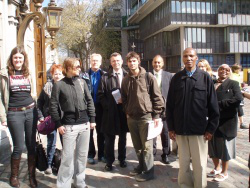Christians hold mining companies to account at their AGMs

Alpheus Blom (far right) & other campaigners outside Anglo-American AGM
London Mining Network member groups – including Christian ethical investment watchdogs, such as the Ecumenical Council for Corporate Responsibility (ECCR) - were well represented at last week’s London AGMs of mining giants Rio Tinto and Anglo-American. At the Rio Tinto AGM on 15 April, they were able to raise a number of concerns, from the health impacts of uranium mining in Namibia to indigenous rights undermined in many Rio Tinto mining projects. Geoff Nettleton of Philippine Indigenous Peoples’ Links welcomed the statement in the Rio Tinto report that the company operates in accordance with the United Nations Declaration on the Rights of Indigenous Peoples, but pointed out that it is not true. He urged the company to work with Indigenous organisations, like the UN Permanent Forum on Indigenous Issues, to arrange independent monitoring.
Richard Solly, a Christian activist on mining and Co-ordinator of the London Mining Network, commented after the Rio Tinto AGM that the future set out by Rio Tinto’s Chief Executive in his presentation and in his answers to questions was “the stuff of nightmares”. Rio Tinto’s Tom Albanese believes that many new mines that will be necessary over the coming years in order to keep pace with minerals demand. “This suggests a future in which more and more of the planet’s surface is scarred by this highly destructive activity” said Solly, “with consequent impacts on water quality and food production; and, in the case of Rio Tinto, with predictable impacts on human rights, rural and coastal livelihoods, traditional cultures and indigenous control of land”. He also felt that Rio Tinto’s enthusiasm for the development of robotics in mining means than fewer local people would be given employment. Albanese also spoke of the company’s desire to increase uranium production, with, says Solly “no mention of the legacy of deadly radioactive pollution which will be left for thousands of generations to come”.
Anglo American was challenged at its 22 April AGM on a range of issues including a legacy of sickness among former miners in South Africa, evictions of communities by subsidiary Anglo Platinum in South Africa and part-owned Cerrejon Coal in Colombia, exploration activities in the Philippines, proposals for a massive copper-gold mine in Alaska, executive pay, and corporate governance.
Fr Frank Nally of the Columban Fathers Solidarity Desk and member of the London Mining Network, stood alongside Alpheos Blom, a 48-year-old South African who worked at Anglo’s President Steyn mine in the Free State for 17 years from 1984 to 2001. “I loaded freshly blasted rocks onto a machine and drove them through the mines” he said, “and now I have a very serious form of silicosis called Massive Fibrosis; I have also contracted TB because of this and I developed this disease because of breathing too much dust from the mine”. He complained that although the mining industry knew that thousands of miners were contracting silicosis each year the black workers had not been given masks or on-site showering facilities to reduce the amount of dust inhaled. He told the AGM that, “as a result of my bad health I am unable to work and yet I have received no help from Anglo American South Africa, a company you own and for which I worked for 17 years”.
Most of the world’s biggest mining companies are listed on the London Stock Exchange, and on its Alternative Investment Market (AIM). London is the world’s biggest centre for investment in the minerals industry: British high street and investment banks, pension funds and insurance companies invest hundreds of millions of pounds a year in scores of mining projects across the globe, connecting working people’s earnings in Britain with the fate of mining-affected communities elsewhere. Mining is one of the most polluting industries in the world, has a disproportionately negative impact on land-based communities, especially Indigenous Peoples, and is frequently associated with forced evictions, militarisation, conflict and human rights abuses.















